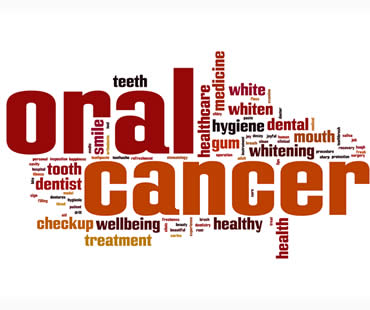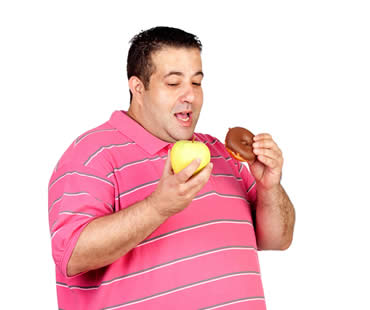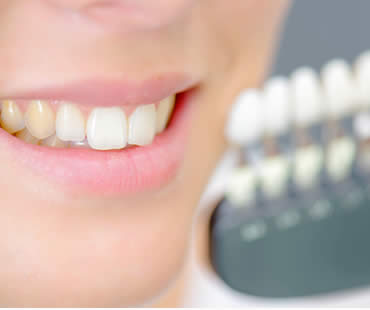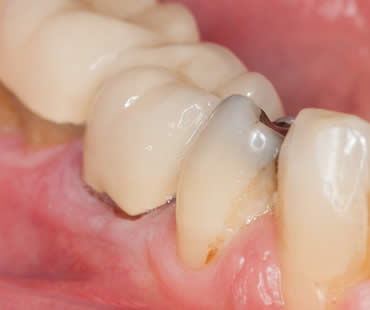
Most people have friends or family who have had to deal with the disease cancer in some area of the body. Cancer can be described as uncontrollable cell growth that invades and damages surrounding tissue. Oral cancer often shows up as a persistent sore or growth in the mouth, but also includes cancers of the tongue, lips, cheeks, palate, throat, and sinuses. Like most cancers, it can be life threatening without early detection and treatment.
Symptoms
Common symptoms of oral cancer include:
- Swelling, lumps, or rough spots on your lips, gums, or other mouth areas
- White or red patches in your mouth
- Numbness or tenderness in your mouth, neck, or face
- Unexplained bleeding in your mouth
- Sore throat or feeling that something is stuck in your throat
- Persistent sores in the mouth, neck or face that bleed easily and do not heal in two weeks
- Hoarseness or chronic sore throat
- Difficulty swallowing, chewing, talking, or moving your jaw or tongue
- Earache
- Substantial weight loss
Risk factors
Men are at twice as high risk for oral cancer than women, and men over 50 are at greatest risk. The biggest risk factors include any kind of smoking or using smokeless tobacco, excessive alcohol consumption, excessive sun exposure, or family history of cancer. However, it’s important to know that more than 25 percent of oral cancers occur in people who do not smoke or only drink alcohol occasionally.
Diagnosis
Routine dental checkups include an examination for signs of oral cancer. A biopsy may be performed on any suspicious areas. Regular checkups are important so that tests can identify oral cancer early, before it can spread or progress.
Treatment
Oral cancer is often treated similarly to other types of cancers. It may include surgery to remove the growth, followed by radiation or chemotherapy to destroy remaining cancer cells.
If you live in the Meriden area contact us today

Obesity, defined as an excess proportion of body fat, has reached epidemic levels in the United States. This condition presents health risks to many areas of your body, and takes a toll on just about every aspect of your life. What does obesity have to do with oral health? Recent studies have linked the development of obesity with oral bacteria.
By testing the saliva of overweight people compared to individuals within a healthy weight range, researchers have discovered an oral bacteria present in 98 percent of the obese subjects. Experts believe this bacteria is an indicator of developing an overweight condition. Also, they suspect that the bacteria may participate in the body functions that lead to obesity.
Preventing and controlling obesity usually begins with analyzing and changing your diet. A high glycemic diet, which generally means a diet high in sugars, contributes to weight gain. It is also connected with your dental health, because sugars in your mouth are converted into plaque. If plaque accumulates on your teeth and gums, the risk increases for tooth decay and gum disease.
While it will likely benefit your waistline to reduce the amount of sugar consumed, doing so will reduce your risks for oral disease. Likewise, regular dental checkups, proper oral hygiene including brushing and flossing twice daily, and smart diet modifications will also lower your oral health risks. As experts continue to investigate the connection between your mouth and your overall health, following recommendations for caring for your mouth will likely decrease oral bacteria and possibly limit your risks of other health concerns such as obesity.
If you live in the Meriden area contact us today

Most people turn to mouthwash when they suspect their breath is bad and they want a quick boost. It’s true that mouthwash comes in handy for this purpose, but did you know that it offers other benefits too?
Reduces bacteria
Antiseptic and anti-plaque mouth rinses are intended to kill germs that cause gum disease, plaque, and bad breath. Swishing this type of mouthwash around your mouth after brushing has been shown to lower the bacteria levels, and therefore decrease your risks of the problems that bacteria can cause. It is especially helpful in senior adults or others who have trouble brushing and flossing their teeth.
Promotes healing
Rinsing with antiseptic mouthwash promotes natural healing of mouth and gum irritations, minor wounds, and canker sores. It removes debris that can irritate your mouth, and can also help reduce inflammations from dental and orthodontic appliances.
Adds fluoride
Some rinses contain fluoride, which helps prevent tooth decay and strengthen teeth. Studies have shown that using fluoride mouth rinses in addition to fluoride toothpaste gives you more protection against cavities than toothpaste alone. Fluoride mouth rinse is not suggested for kids under six years old because they might swallow it.
Relieves pain
Antiseptic mouth rinses have been shown to help reduce tooth pain, probably due to lowering the bacteria and inflammation in your mouth.
Helps with certain conditions
Dentists sometimes prescribe special mouth rinses designed for various oral conditions. This may include gum disease, high risk of tooth decay, or dry mouth. Also, oral rinses may be prescribed after periodontal treatments or oral surgery.
Supplements dental hygiene
Many dentists suggest making dental rinses part of your oral hygiene routine, but remember that it’s only a supplement to brushing and flossing regularly.
If you need a dentist in Meriden contact us today

It’s hard to miss with advertisements and visits to the dentist that tartar is something you want to avoid for good oral health. But do you know what this substance is, how to keep from getting it, and what to do if tartar does develop?
What’s so bad about tartar?
Even if you brush and floss regularly, it’s impossible to get rid of all of the bacteria in your mouth. Bacteria and food residue combine to form plaque on your teeth. If left to thrive, plaque attacks your teeth and gums. It causes decay, gum inflammation, and will harden into tartar if not removed before it has the chance.
What does it do to my teeth and gums?
Tartar buildup makes it more difficult to brush and floss well, and tartar along your gums may lead to gum disease. Mild gum disease, or gingivitis, is often caused by plaque and tartar on your teeth. It can usually be reversed with careful dental hygiene. If left untreated, it will progress into periodontitis. This more serious gum disease can damage the bones and tissue that support your teeth, increasing your risk of tooth loss. It may also cause infections that contribute to heart disease and other health problems.
How can I control tartar?
Here are some ways to prevent tartar formation:
- Brush at least twice daily long enough to thoroughly clean every tooth and all of your gums. Consider using an electric toothbrush, which may be more effective for plaque removal.
- Use tartar-control fluoride toothpaste. It is formulated to help prevent tartar formation, and the fluoride can repair damage to your teeth that may have already begun.
- Floss every day to reach the areas that brushing cannot.
- Eat a healthy diet low in sugars and starches, and limit snacks between meals. Drink plenty of water to help rinse away plaque and bacteria.
- Don’t smoke because tobacco use has been shown to increase tartar buildup.
How do I get rid of it?
A professional cleaning is the only way to successfully remove tartar. See your dentist every six months for checkups and cleanings.
If you live in the Meriden area contact us today

Receding gums not only look unattractive, they can harm your health. If you notice that your gums are receding, ask your dentist for help so that you can reverse the problem instead of allowing it to worsen. The goal is to catch gum recession early and get it under control before it turns into periodontal disease.
What exactly is gum recession? It’s the condition in which the outer tissue on a tooth begins to wear away toward the root, leading to exposure of your tooth enamel and eventually your tooth’s root. If untreated, receding gums lead to periodontal disease. The best way to avoid this problem is to prevent it from starting in the first place. This is easily done by performing good oral hygiene techniques. Brush twice a day with a soft toothbrush using a circular motion and mild pressure. Also, floss your teeth every day.
If you see that your gums are starting to recede, it’s likely that practicing better dental hygiene will restore your gum health over time. A deep cleaning by your dentist will help kick-start your hygiene routine at home. In some cases, an even deeper cleaning called root planing may be necessary.
For more advanced cases of gum recession, your dentist may need to take tissue from other areas and use it to cover exposed roots. This can boost your gum tissue and make it healthy again. If you experience pain and increased sensitivity due to exposed roots, your dentist may prescribe medications to help.
The main thing to remember about receding gums is that quick action is important. Good dental care is key in both preventing it and in correcting the problem after it has begun. If you notice that your gums are pulling away from your teeth or experience sensitivity, start the healing process as soon as possible by asking your dentist for treatment advice.
We look forward to seeing you in our Meriden dental office

Most people who bite their nails wish they didn’t do it. If you’re a nail biter, you probably know that it spreads germs and leaves your nails looking unattractive. But did you know that it can harm your teeth? Let’s find out the connection between nail biting and tooth damage, and learn some ways to stop this nasty habit.
What does nail biting do to my teeth?
Just like chewing on hard items like ice, nails are hard and put stress on your teeth when you bite down on them. With time, your teeth will weaken and your teeth can chip or break. Since nail biting is a repetitive habit, constant chewing on your teeth wears them down faster than they should. Your teeth also can become more sensitive when the enamel is worn down. Additionally, biting your nails can move your teeth out of place. Your gums are at risk too from the additional stress the nail biting puts on them, eventually leading to gum disease and even tooth loss.
What if I wear braces?
Braces already add pressure on your teeth, so nail biting can stress them even more. The roots of your teeth can be weakened, which leads to problems like tooth loss.
How can I stop biting my nails?
Here are some tips to help you stop the nail biting habit:
- Get a hobby that uses your hands, like video games, knitting, or painting.
- Occupy your mouth by chewing sugarless gum, sucking on mints, or eating carrot sticks.
- Add foods to your diet containing calcium and magnesium because they help repair and grow your nails.
- Cover your nails with tape, petroleum jelly, fake nails (for girls), or foul-tasting liquid.
- Get manicures to make your nails look nice, so you will be less inclined to bite them.
If you live in the Meriden area contact us today














